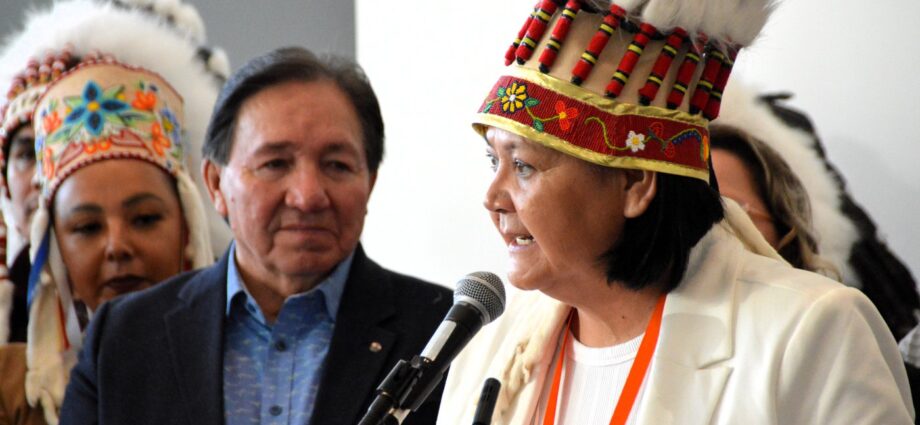
By Dave Baxter, Local Journalism Initiative Reporter, Winnipeg Sun
December 16, 2023
The Canadian Association of Schools of Nursing (CASN) is acknowledging and apologizing for what they say has been long-running and systemic inequalities and racism in nursing education in Canada.
This week, Cynthia Baker, the executive director of CASN, a national organization that calls itself the “voice” of nursing education in Canada, publicly apologized for what she said has been inequitable access to nursing education for Indigenous people across the country, fuelled by “systemic racism.”
“We acknowledge that too often, access to nursing education has been inequitable and unjust for Indigenous Peoples,” the apology states. “We also acknowledge that the experiences of Indigenous students and faculty within the nursing education system have not always been respectful, or culturally safe.”
The apology says that while systemic racism has caused challenges for those pursuing nursing education and careers, it has also caused challenges for Indigenous Canadians seeking health care.
“We acknowledge that many graduates of Canadian schools of nursing provide care to Indigenous patients that is racist and culturally unsafe,” the apology reads.
The public apology also marks what CASN is calling a new “commitment to positive change.”
“We recognize that actions speak louder than words, and we are dedicated to taking action that will foster anti-racism, cultural safety, and cultural humility in Canadian schools of nursing, and in our organization,” the apology reads.
CASN has now listed five steps they say will address “past harms” inflicted by nursing education in Canada, including implementing new “anti-racism” and “culturally safe” protocols, education and resources, and practices that specifically address anti-Indigenous racism.
They also say they will do a full review of nursing education curriculum and make curriculum revisions where they are needed, among other proposed changes.
Asked for comment on the apology, Manitoba Nurses Union (MNU) President Darlene Jackson said in a written statement the union has incorporated protocols and language into their collective bargaining agreement that promote inclusion and diversity, and combat systemic racism, and anti-Indigenous racism.
“We believe in removing barriers, and taking responsibility for the past,” Jackson said.
The current MNU collective bargaining agreement states that “The Union and the Employer agree with the goal of achieving a representative workforce for First Nations, Métis, and Inuit peoples who are significantly underrepresented in the health workforce.”
It also states several additional actions “needed to promote and facilitate employment of Indigenous persons in health care occupations at all levels,” and a promise to collaborate in finding constructive ways of implementing the Calls to Action outlined by the Truth and Reconciliation Commission of Canada. (TRC)
After the apology was released, the Assembly of Manitoba Chiefs (AMC) released a statement in response, and said while both the apology and proposed changes are a “significant step,” AMC has other specific recommendations to improve nursing education for Indigenous people.
AMC said changes in protocol should also be focused on faculty training to recognize and address effects of historical traumas, and mental health and wellness support.
The AMC would also like to see increased efforts at recruitment from remote and northern communities, and more financial support to alleviate financial barriers for Indigenous people, and those from remote communities forced to leave home to pursue nursing as a career.
In a statement, Association of Regulated Nurses of Manitoba (ARNM) executive director Joyce Kristjansson said the organization was pleased to see CASN’s acknowledgement and apology, and hopes to see more work done to promote inclusion in nursing education and the inclusion of Indigenous peoples in the nursing field.
Kristjansson added ARNM is now planning to work directly with Indigenous leadership to learn how best to serve Indigenous students and communities.
“We are a signatory of the Winnipeg Indigenous Accord, and are looking forward to working with AMC Grand Chief Cathy Merrick on the Anti-Racism Working Group being set up through the AMC’s Chiefs Task Force on Health,” she said
“We have conducted education and information sessions, as have the nursing Colleges to start conversation about racism and discrimination that occur in health care, and the responsibility of each of us to deal with it in our daily practice.”
Subscribe to our newsletter.
— Dave Baxter is a Local Journalism Initiative reporter who works out of the Winnipeg Sun. The Local Journalism Initiative is funded by the Government of Canada.


